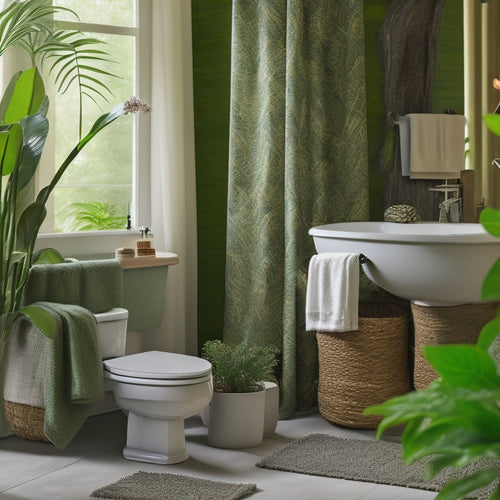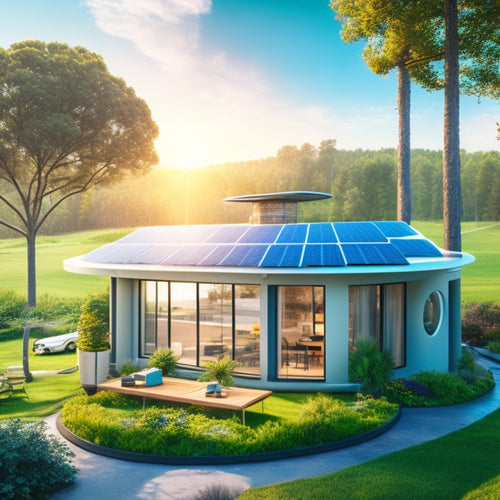
Eco-Friendly AC Units: Cool Apartments Save Energy
Share
You can adopt an eco-friendly lifestyle and slash your energy bills by up to 50% with advanced air conditioning units that not only cool your apartment but also help reduce your carbon footprint. By investing in energy-efficient ACs, you'll benefit from lower energy consumption, sustainable materials, and improved indoor air quality. Look for units with high Energy Star, SEER, EER, and CEER ratings to guarantee optimized performance. Top brands like Daikin, Mitsubishi Electric, and Panasonic offer innovative solutions. Proper installation, maintenance, and smart thermostat integration can further maximize your savings, and there are even incentives like tax credits and utility rebates to sweeten the deal - now, investigate the latest trends in AC tech to uncover even more opportunities to cool your apartment while saving energy.
Key Takeaways
- Eco-friendly AC units reduce energy consumption, leading to lower utility bills and a minimized carbon footprint.
- Look for Energy Star certification, high SEER ratings, and advanced technologies like inverter technology and geothermal cooling for optimal energy efficiency.
- Proper installation, regular maintenance, and strategic placement can enhance the performance and efficiency of eco-friendly AC units.
- Top brands like Daikin, Mitsubishi Electric, and Panasonic offer innovative and sustainable cooling solutions for apartments.
- Incentives like tax credits, utility rebates, and manufacturer discounts can help offset the initial cost of eco-friendly AC units.
Types of Energy-Efficient ACs
When shopping for an eco-friendly air conditioner, you're likely to come across several types of energy-efficient AC units that cater to different needs and preferences.
Window units, for instance, are ideal for small spaces, while portable systems offer flexibility and ease of movement.
Split systems, on the other hand, provide a more permanent solution, with indoor and outdoor units connected via a refrigerant line.
Geothermal cooling systems utilize the earth's natural temperature to cool your space.
Inverter technology allows for precise temperature control, while ductless mini splits eliminate the need for ductwork.
Additionally, considering the rising trend of sustainable living, many homeowners are now opting for renewable energy sources to power their AC units, reducing their carbon footprint.
Moreover, some AC units are designed with energy storage systems to maintain a stable power supply during peak demand.
Smart thermostats optimize energy consumption, and self-cleaning models reduce maintenance.
Consider your specific requirements and investigate these options to find the perfect eco-friendly AC unit for your space.
Benefits of Eco-Friendly Cooling
By opting for an eco-friendly air conditioner, you're not only reducing your carbon footprint but also reaping a multitude of benefits that directly impact your wallet, health, and overall quality of life.
These benefits include lower energy bills, thanks to the unit's ability to optimize energy consumption. Additionally, eco-friendly ACs often incorporate sustainable materials, reducing waste and promoting a healthier environment.
You'll also enjoy improved indoor air quality, as these units are designed to remove pollutants and allergens from the air. Moreover, smart technology integration enables you to control your AC remotely, ensuring you're only using energy when needed.
As fleets shift to renewable energy solutions, consumers can also contribute to a more sustainable future by adopting eco-friendly appliances. By doing so, they can reduce their reliance on fossil fuels and lower their carbon footprint.
AC Energy Efficiency Ratings
When shopping for an eco-friendly AC unit, you'll want to pay attention to its energy efficiency ratings.
Look for the Energy Star certification, which indicates that the unit meets energy efficiency standards set by the U.S. Environmental Protection Agency.
In addition, check the unit's SEER, EER, and CEER ratings, which measure its energy efficiency during different operating conditions.
As we shift towards sustainable living, adopting energy-efficient solutions like Electric Vehicles can greatly reduce our carbon footprint.
Moreover, understanding the importance of energy efficiency in our daily lives can lead to a considerable reduction in greenhouse gas emissions.
Energy Star Certification
How do you know if your air conditioner is energy efficient? One way is to look for the Energy Star certification, a label given by the U.S. Environmental Protection Agency (EPA) to products that meet energy efficiency standards. To earn this certification, an air conditioner must undergo a rigorous testing and certification process. The benefits of Energy Star certified ACs include significant energy savings and reduced greenhouse gas emissions.
| Feature | Benefit |
|---|---|
| Energy Efficiency | Saves you money on energy bills |
| Environmental Impact | Reduces greenhouse gas emissions |
| Testing and Certification | Meets rigorous energy efficiency standards |
| Government Backing | Recognized by the U.S. EPA as an energy-efficient product |
High SEER Ratings Matter
As you shop for an eco-friendly air conditioner, you're likely to come across SEER ratings, which measure an AC unit's energy efficiency.
SEER stands for Seasonal Energy Efficiency Ratio, and it's vital to understand its significance.
Commercial solar charging systems leveraging renewable energy also promote energy independence and reduce carbon emissions.
A higher SEER rating indicates higher efficiency, which translates to lower energy consumption and reduced utility bills.
Opting for a high SEER-rated AC unit is fundamental for minimizing your carbon footprint and maximizing your energy savings.
Look for units with SEER ratings of 15 or higher for ideal performance.
High efficiency equals more freedom from energy waste and a clearer conscience.
EER and CEER Explained
Your air conditioner's energy efficiency is further broken down into two additional ratings: EER and CEER.
EER, or Energy Efficiency Ratio, measures the unit's energy efficiency when the outdoor temperature is at a steady 95°F. It's calculated by dividing the cooling capacity in Btu/h by the power input in watts.
When considering eco-friendly options, it's crucial to investigate solar-powered systems that can lead to potential annual savings of $500 to $2,000+.
CEER, or Combined Energy Efficiency Ratio, is a more thorough measure that takes into account the unit's performance at various temperatures and humidity levels. A higher CEER rating indicates better energy efficiency across different operating conditions.
When shopping for an eco-friendly AC unit, look for high EER and CEER ratings, which indicate advanced cooling technologies that can help you save energy and reduce your environmental footprint.
Top Brands for Green Cooling
When it comes to eco-friendly AC units, several top brands stand out for their commitment to green cooling solutions.
You'll want to take into account these industry leaders when shopping for an energy-efficient air conditioner.
-
Daikin: Known for their innovative cooling technologies, Daikin offers a range of eco-friendly AC units with high EER and CEER ratings.
-
Mitsubishi Electric: This top eco-friendly brand provides advanced air conditioning solutions that minimize environmental impact while maximizing energy savings.
-
Panasonic: With a focus on sustainability, Panasonic offers eco-friendly AC units that incorporate state-of-the-art technology to reduce energy consumption and carbon emissions.
Installation and Maintenance Tips
When you install an eco-friendly AC unit, you'll want to guarantee it's done correctly to maximize its efficiency.
You'll need to take into account proper placement, as this can affect airflow and overall performance.
Additionally, you'll need to prioritize efficient ductwork and regular filter cleaning to keep your unit running smoothly and sustainably.
Proper Placement Matters
One essential aspect of maximizing the efficiency and eco-friendliness of your AC unit is strategic placement.
You'll want to take into account the following factors to guarantee peak performance:
-
Unit orientation: Position your AC unit to minimize direct sunlight exposure, which can increase energy consumption.
-
Room layout and airflow management: Place the unit in a way that allows for unobstructed airflow, creating temperature zones that promote even cooling and reduce hotspots.
-
Space utilization and equipment positioning: Reflect on the room's layout and surrounding vegetation when positioning the unit, making sure it doesn't interfere with space utilization and airflow.
Efficient Ductwork Required
By optimizing your AC unit's placement, you've taken a significant step towards eco-friendly cooling.
Now, it's important to guarantee your ductwork is efficient to maximize energy savings. Proper duct sealing is necessary to prevent energy loss through leaks and gaps. You can achieve this by inspecting and sealing any openings with mastic sealant or foil tape.
Additionally, airflow optimization is essential to guarantee your AC unit operates at its best. Make sure to install ducts with the correct size and configuration to facilitate smooth airflow.
Regular Filter Cleaning
Dirty filters restrict airflow, forcing your AC unit to work harder and consume more energy.
Regular filter cleaning is crucial for maintaining peak air quality and reducing energy consumption. By keeping your filters clean, you'll breathe easier and enjoy lower energy bills.
- Check your filters monthly and clean or replace them as needed.
- Use a soft brush or vacuum to gently remove dirt and debris from the filters.
- Consider upgrading to high-efficiency filters, which can capture smaller particles and improve indoor air quality.
Proper filter maintenance guarantees your AC unit operates efficiently, saving you money and promoting a healthier living space.
Cost Savings and Incentives
Switching to eco-friendly AC units can lead to significant cost savings over time, as they're designed to consume less energy while maintaining a comfortable indoor climate. You'll notice the difference on your utility bills, and you may even be eligible for incentives.
| Incentive Type | Amount | Eligibility |
|---|---|---|
| Tax Credits | Up to $300 | Purchase of an Energy Star-certified AC unit |
| Utility Rebates | $25-$100 | Installation of an energy-efficient AC unit |
| State Incentives | Varies | Check with your state's energy department for specific programs |
| Manufacturer Rebates | $20-$50 | Purchase of a specific eco-friendly AC unit model |
These incentives can help offset the initial cost of purchasing an eco-friendly AC unit, making the shift even more attractive. By taking advantage of these offers, you'll be enjoying the benefits of a cooler, more energy-efficient home while also saving money.
Emerging Trends in AC Tech
As you reap the benefits of cost savings and incentives, you're likely wondering what's on the horizon for eco-friendly AC units. The industry is rapidly changing, and emerging trends are revolutionizing the way we cool our apartments.
-
Smart thermostat integration is becoming increasingly popular, allowing you to control your AC unit remotely and optimize energy consumption based on your schedule and preferences.
-
Solar powered systems are gaining traction, enabling you to utilize renewable energy and reduce your reliance on the grid.
-
Advanced inverter technology is improving efficiency and reducing noise levels, providing a more comfortable and peaceful living space.
Frequently Asked Questions
Can I Install an Eco-Friendly AC Unit Myself to Save Money?
You can attempt a DIY installation to save money, but consider your technical knowledge and local regulations before taking on the project, as improper installation may void warranties and compromise cost savings.
Are Eco-Friendly AC Units Compatible With Smart Home Systems?
You'll be pleased to know that many eco-friendly AC units seamlessly integrate with smart home systems, allowing you to utilize smart technology integration and energy monitoring systems to optimize performance and energy efficiency.
Do Eco-Friendly AC Units Require More Frequent Filter Replacements?
You'll find that eco-friendly AC units surprisingly don't require more frequent filter replacements, as their advanced designs prioritize filter maintenance, allowing you to reap energy savings while enjoying a healthier indoor environment with minimal upkeep.
Can I Retrofit My Existing AC Unit to Make It More Energy-Efficient?
You can retrofit your existing AC unit with energy-efficient upgrades, but you'll need to conduct a cost-benefit analysis to determine if the investment pays off; consider factors like unit age, usage, and local incentives to make an informed decision.
Are Eco-Friendly AC Units Suitable for Apartments With Limited Outdoor Space?
You'll find that window units and portable air conditioners are suitable options for apartments with limited outdoor space, as they're compact, easy to install, and don't require extensive venting or ductwork, providing you with efficient cooling and freedom from space constraints.
Related Posts
-

Sustainable Scrubbing: Top Bathroom Solutions for Earth-Conscious Homes
You're taking an important step towards creating a more sustainable home by switching to eco-friendly bathroom cleani...
-

What Cool Roof Tax Breaks Can Homeowners Claim?
You can claim federal tax credits of up to $500 and state and local incentives for installing cool roofs, which not o...
-

Gamify Your Home's Energy Generation and Savings
You're taking the next step in optimizing your home's energy generation and savings by utilizing the power of gamific...


